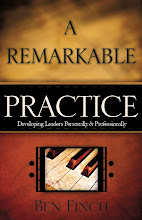(The following is a partial manuscript of my message from this past Sunday morning. I apologize for the lengthiness, but I hope you take the time to read).
Isn't it funny how two people can be in the same location yet have two totally different experiences. And, much of it has to do with their perspective.
Religion vs. the Gospel
"And He also told this parable to some people who trusted in themselves that they were righteous, & viewed others with contempt:
"Two men went up into the temple to pray, one a Pharisee & the other a tax collector.
The Pharisee stood up & was praying this to himself: 'God, I thank You that I am not like other people: swindlers, unjust, adulterers, or even like this tax collector.
I fast twice a week; I pay tithes of all that I get.'
But the tax collector, standing some distance away, was even unwilling to lift up his eyes to heaven, but was beating his breast, saying, 'God, be merciful to me, the sinner!'
I tell you, this man went to his house justified rather than the other; for everyone who exalts himself will be humbled, but he who humbles himself will be exalted." Luke 18:9-14
Narrative Analysis & Exposition:
(v.9) "He also told this parable to some people who trusted in themselves that they were righteous, & viewed others with contempt."
We see in verse 9 that Jesus had a very specific audience for this parable--it was directed towards those who trusted in themselves, that they were righteous & viewed others with contempt--They believed that their morality & activity earned good-standing before God & therefore, they viewed others who were not up to their standard with contempt. Whether spoken or not, these people regarded others as nothing, the basis that others were worthless & have no value. This is a clear example of an "expression of self-admiration." They had a faulty view of themselves, in essence, thinking, "God should be so happy to have me!"
(vs. 10) "Two men went up into the temple to pray, one a Pharisee & the other a tax collector."
We know by Jewish history that there were two time periods in a day that were reserved for public prayer in the Temple--the 3rd hour = 9:00 am & the 9th hour = 3:00 pm. A Pharisee was a very devout, dedicated, & committed individual; it is likely he would often make both prayer times at the Temple. The "things" of God constantly surrounded one who lived a pharisaic lifestyle. Pharisees were well respected by their community due to their religious devotion & prominent roles in religion. If you wanted to compare to today--you may compare a Pharisee in many respects to a pastor, elder, bishop, right-wing conservative, fundamental, etc. They get a very bad reputation due to their confrontations with Jesus (concerning their hearts & motives), but overall, people in their community looked up to them. Now, a tax collector is a different story. Others often despised tax collectors. They were viewed as traitors & thieves: they were Israelites being employed by Rome & they often over-charged their fellow countrymen in hopes that they could pocket some extra money. During this time, the Romans governed the land of Israel; therefore, the taxes collected went to Rome. For example, what if the USA was ruled by another country, say--Canada. Just kidding, I mean seriously--who am I kidding, Canada? (I will go ahead & apologize to the Canadians for using them as a joke). Say the Canadians take over the USA & they hire our fellow men to collect taxes from every family, then upon collection, they send them north to 'land o' Canada.' Do you think that would go over very well?
(v. 11) "The Pharisee stood up & was praying this to himself: 'God, I thank You that I am not like other people; swindlers, unjust, adulterers, or even like this tax collector.' (v.12) I fast twice a week; I pay tithes of all that I get."
The two verses offer a glimpse into the heart of the Pharisee. Just consider the ego-centrality of this statement: "I thank...that I am not...I fast....I pay...all that I get." Rather than thanking God for what God has done for him, the Pharisee arrogantly brags to God about his own moral purity & religious piety. He made the terrible mistake of comparing himself to others rather than to God. Based upon those around him, he was 'religiously awesome.' Just consider his devotion: "I fast twice a week." Did you know that the OT law did not require a person to fast but apparently once a year on the Day of Atonement? But the wording that Jesus uses shows that this man had a continual lifestyle of fasting--apparently twice a week. In addition to abstaining from food, he would humble himself by praying, mourning, & wearing sackcloth (Matthew 6:16-18). In addition, this man tithed biblically, " tenth of his grain, new wine, oil, the firstborn of his herd, & his flock." Based upon his performance, a religious person would think that God was well pleased with him...unless God judged differently. He was morally excellent, yet was blinded to his own sin.
(v.13) "But the tax collector, standing some distance away, was even unwilling to lift up his eyes to heaven, but was beating his breast, saying, 'God, be merciful to me, the sinner!"
If you could picture with me, the tax collector barely within the confines of the Temple court, beating his breast in grief & contrition. He knows that if God bases His judgment upon this man's performance, he is literally damned. And, in his unwillingness to even look towards God, he begs of God, "God, be merciful to me, the sinner!" Now this statement, in my opinion, is easy to overlook in most English translations. There is a Greek word here, "hilastheyti," that is sometimes translated "be merciful." And, for some reason, the word "mercy" carries little weight anymore. Consider this: "God, be my propitiation, I am guilty!" Propitiation literally means "appeasement" or "satisfaction." This man, in complete humility before God, in essence, says, "God, if possible, fulfill your wrath, anger, & indignation towards me in some other way; otherwise, I am without hope."
(v. 14) "I tell you, this man went to his house justified rather than the other; for everyone who exalts himself will be humbled, but he who humbles himself will be exalted."
Jesus ends the parable stating that only one man left the Temple courts having been declared right in God's judgment. "The sacrifices of God are a broken spirit; A broken & contrite heart, O God, You will not despise." Psalm 51:17
Contrast
One man thought he was righteous & tried to justify himself. He was very close to religious activity yet far from God. He depended upon His own effort as a way to be justified before God. The tax collector was dependent upon God's mercy & as a result received God's gift of righteousness & was pronounced justified.
One realizes the depths of his sinfulness & the expanse of God's grace & responds in faith, while the other, does not realize his sin, has faith in himself, acts with contempt toward others, & responds critically.
"As sinners, we are prone to pursue a relationship with God in 1 of 2 ways. The 1st is religion/spirituality & the 2nd is the gospel. The two are antithetical in every way."
Martin Luther
"Every time we look at the cross Christ seems to be saying to us, "I am here because of you. It is your sin I am bearing, your curse I am suffering, your debt I am paying, your death I am dying."
John Stott
The only favor or standing a person has before God is that by grace, their faith is in Jesus Christ. Be reconciled to God.










